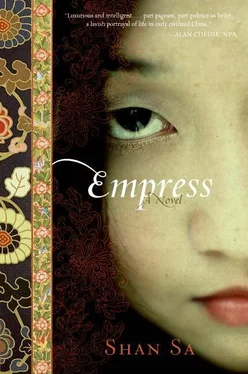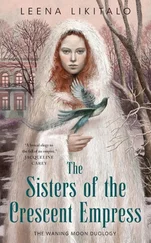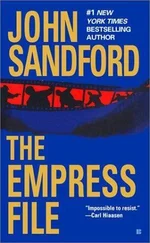Shan Sa - Empress
Здесь есть возможность читать онлайн «Shan Sa - Empress» весь текст электронной книги совершенно бесплатно (целиком полную версию без сокращений). В некоторых случаях можно слушать аудио, скачать через торрент в формате fb2 и присутствует краткое содержание. Жанр: Историческая проза, на английском языке. Описание произведения, (предисловие) а так же отзывы посетителей доступны на портале библиотеки ЛибКат.
- Название:Empress
- Автор:
- Жанр:
- Год:неизвестен
- ISBN:нет данных
- Рейтинг книги:5 / 5. Голосов: 1
-
Избранное:Добавить в избранное
- Отзывы:
-
Ваша оценка:
- 100
- 1
- 2
- 3
- 4
- 5
Empress: краткое содержание, описание и аннотация
Предлагаем к чтению аннотацию, описание, краткое содержание или предисловие (зависит от того, что написал сам автор книги «Empress»). Если вы не нашли необходимую информацию о книге — напишите в комментариях, мы постараемся отыскать её.
Empress — читать онлайн бесплатно полную книгу (весь текст) целиком
Ниже представлен текст книги, разбитый по страницам. Система сохранения места последней прочитанной страницы, позволяет с удобством читать онлайн бесплатно книгу «Empress», без необходимости каждый раз заново искать на чём Вы остановились. Поставьте закладку, и сможете в любой момент перейти на страницу, на которой закончили чтение.
Интервал:
Закладка:
They twirled with their arms in the air like butterflies struggling in a rainstorm. These innocent creatures could not know that they would be struck down by misfortune. Before the banquet, a serving woman had come to denounce their mothers to me. Lady Liu and the Favorite Duo had set up an occult altar in a secret alcove within their palace. With their evil incantations, they had called forth the souls of my two rivals, the deposed Empress Wang and the disgraced concubine Xiao, and had ordered them to destroy me. Anyone who practiced sorcery was condemned to death by law, but I would not give Lai Jun Chen the pleasure of spreading a family scandal. That evening, neither Lady Liu nor the Favorite Duo, who was sitting in the shadows, would return home. My eunuchs had received orders to keep them back at the end of the meal. They would help them to commit suicide.
I could almost hear the orphans weeping, but I felt no pity. The following day an imperial decree would order my grandsons to abandon their residences and come to live in an enclosed wing of my palace. By holding his heirs hostage, I would find it easier to watch over Miracle, whom I could not punish.
The princes stepped back, and my nephew Piety came forward. He prostrated himself energetically and called loudly for me to have ten thousand years of good health. He had barely returned to his seat when the musicians began to play the Melody of Long Life. The doors of the Palace were drawn open, and one hundred dancing girls streamed onto the vermillion carpet of silk and wool threaded with gold. They wore black scholars’ caps, mauve tunics lined with yellow, emerald colored belts, and gray trains, and they performed a dance devised for my birthday by Piety.
My eldest nephew sat in the half light smiling and clapping in time to the music. He was now over fifty and had a curly beard, thick eyebrows, a hooked nose, and eyes that blazed with ambition-a curious mixture of features inherited from my Father and the latter’s first wife who had some Tatar blood. Everything about my son Miracle and my nephew Piety was different. The first, an imperial prince, had grown up surrounded by silk and velvet; the second, son of my commoner brother who had been scorned and exiled, had lived in contempt and poverty. Miracle had been given the title of king when he was four years old; Piety had become king when he was fifty. Miracle, the fervent Buddhist, refused to kill game; Piety, the cannibal, beheaded his enemies without a moment’s hesitation. Miracle, the poet, felt only distaste for command; Piety, the banished, longed for revenge.
My nephews’ rise had shadowed my sons’ fall. Ever since Splendor’s death, Wisdom’s suicide, and Future’s exile, Piety-now head of the Wu clan-had adapted to his good fortune and done everything he could to improve his position. He may have looked coarse, but he did understand the subtleties of human relations. He had defended my legitimacy, he had supported the magistrates in their persecution of the conspirators, and he had organized the personality cult surrounding me. When my own sons had tried to revolt against my authority, he had urged officials to sign the petition calling for my accession. It was also him, with his feverish imagination, who had invented all the emphatic titles that the Court was so eager to give me.
The blood of a wood merchant flowed in our veins. Piety, who was not unlike me, had inherited from Father an infallible calculating mind. The very day after my coronation, he had set to work on having himself recognized as heir to the throne. The fact that my sons were descended from the overthrown household did, indeed, throw some doubt over the legitimacy of my reign. If Miracle came to the throne, he would reinstate his father’s dynasty. If Piety, my nephew, were appointed as successor, he would more likely ensure the eternal sovereignty of our Wu clan.
Opinion was divided in Court. Some of the ministers saw my reign as a glorious extension of my husband’s; these were men who consented to grant me their loyalty so long as my son Miracle continued to represent a moral guarantee for the future. But there were countless young officials united behind Piety and my nephews, determined to replace the former dynasty’s dignitaries. They called for a break with the past and insisted we have a radical and bloody revolution.
That evening, once again, I looked back and forth between my son and my nephew. I had no strong ties of affection with either of them. Both were yoked to me by blood. I was hurt by Miracle’s indifference and put on my guard by Piety’s ardor. If Miracle were Emperor after my death, he would probably remember the mother who had brought him into the world whereas, if Piety were sovereign, he would surely be eager to honor his father, the brother I loathed, and his mother, the sister-in-law I despised. Even if I had forgiven the Wu clan for humiliating my mother and assassinating Little Sister, my nephews would always remember the period of exile that had robbed them of their youth. Even though I had brought our ancestors into the Eternal Temple, even though I had handed out provincial kingdoms to my nephews and the seals of county princes to their sons, this generosity was only a display of reconciliation. The clan had been both my torturer and my victim. The magnificence of the present could not erase the past, the Wu village with its small dark rooms. There was only a self-interested kind of solidarity between my nephews and myself. They gave me political leverage, and I held their future in my hands.
GENTLENESS WOKE ME from my reverie. The music was growing louder, bonze bells were ringing, and thousands of birds were singing. The dancing girls knelt on the ground and then flipped over backward, their faces disappearing in a ripple of sleeves. A giant peony opened up one petal at a time, and in the heart of this great flower, I read the characters, “Ten thousand years to the Sacred Emperor.” I ordered for a glass of wine to be taken to Piety to congratulate him for his creation. Proud and gratified, he prostrated himself toward me and downed the entire glass. Miracle sat facing him, his bored expression unchanged.
Not far from him, Spirit, my eldest brother’s son, suppressed a grimace and forced himself to smile at his cousin.
Spirit was beautiful, elegant, and cultured; he was the one successful incarnation in a clan bent on raising its status to extraordinary heights. Where Piety was still rigid and unrefined as a peasant, Spirit-who was five years younger than him-was from a more highly evolved strain, comprising subtlety and an urbane ambiguity. Piety was as inflexible as Spirit was amenable. The first was like an attacking chariot storming forwards; the second could navigate every kind of current, could insert himself through every closed door. The more demonstrations of loyalty Piety laid on, the less I trusted him. Spirit kept to his cousin’s shadow, but he showed me genuine adulation. While he urged Piety to supplant Miracle, he knew how to tackle my son, who the officials no longer dared approach. He slipped easily from one camp to the other, and he strove to reconcile my ministers with the clan by acting as my secret messenger. The more impatient Piety was to oust Miracle from the Eastern Palace and take up residence there himself; the more adroitly Spirit carried out his work. His maneuvering had not escaped my attention. Spirit also wanted the title of Supreme Son and was waiting patiently for the outcome of this insoluble conflict: The two cousins would kill each other, and he would then present himself as the ideal candidate.
The Princess of Eternal Peace was sitting close to Spirit, but she seemed distracted. With her oval face, wide forehead, and full mouth, her slender, well-muscled body and her haughty, energetic bearing, she was disturbingly like me in my youth. Given that her ancestors, grandfathers, father, mother, and brothers had all been Emperor, my only daughter wore her name, Moon, with glory. My large family of descendants paled in comparison to her luminous presence, they were the insignificant stars in my darkness. I had renounced the affection of my sons long ago and concentrated all my maternal passions on her. She was erudite, intelligent, and blessed with a scope for politics that was lacking in the male members of both clans. But this princess would never be heir to the throne: The ministers would not let her reign; her brothers and cousins would join forces to supplant her; the people would see her accession as a usurping of power and would rise up in revolt on the smallest sign from one of the princes. Moon was sentimental, tortured, hesitant, and fragile. She could advise, but she would never subdue. Too much power would have killed her.
Читать дальшеИнтервал:
Закладка:
Похожие книги на «Empress»
Представляем Вашему вниманию похожие книги на «Empress» списком для выбора. Мы отобрали схожую по названию и смыслу литературу в надежде предоставить читателям больше вариантов отыскать новые, интересные, ещё непрочитанные произведения.
Обсуждение, отзывы о книге «Empress» и просто собственные мнения читателей. Оставьте ваши комментарии, напишите, что Вы думаете о произведении, его смысле или главных героях. Укажите что конкретно понравилось, а что нет, и почему Вы так считаете.





